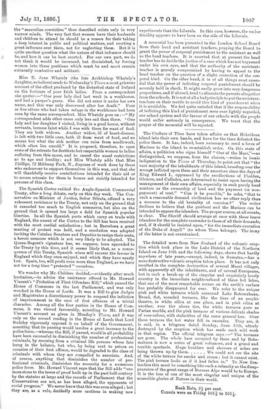We wonder why Mr. Childers decided,—evidently after much isesitation,—to advise
the resistance offered to Mr. Howard Vincent's "Probation of First Offenders Bill," which passed the House of Commons in the last Parliament, and was only wrecked in the House of Lords. It was a Bill to give Judges and Magistrates a discretionary power to suspend the infliction of imprisonment in the case of first offences of a trivial character. Among all the four parties in the House of Com- mons, it was viewed favourably, according to Mr. Howard Vincent's account as given in Monday's Times, and it was only on the second reading in the House of Lords that Lord Su.deley vigorously opposed it on behalf of the Government, asserting that its passing would involve a great increase to the police force,—whereas the Bill, if passed, would in all probability have been successful in diminishing the number of professional criminals, by rescuing from a criminal life persons whose fate bung in the balance, bat who, by being sent to prison on occasion of their first offence, would be degraded to the class of criminals with whom they are compelled to associate. And, of course, anything that diminishes the number of pro- fessional criminals, diminishes the necessity for a numerous police force. Mr. Howard Vincent says that the Bill adds "one more stone to the tower of proof built up in the past half-century by the statutes at large and the records of Parliament that the Conservatives are not, as has been alleged, the opponents of social progress." We never knew that this was even alleged ; but they are, as a rule, decidedly more cautious in making new experiments than the Liberals. In this case, however, the undue timidity appears to have been on the side of the Liberals.


































 Previous page
Previous page